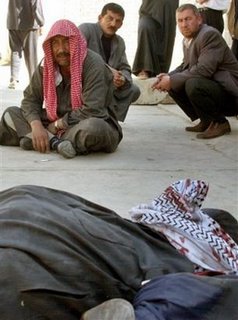
Maxx does not welcome our marshmallowy overlords.
Kittenz, astronomy, science, photography and other four-legged snarky stuff.
The most startling moment in "My Year in Iraq," L. Paul Bremer III's memoir from his days as the head of the American occupation, comes near the end, when violent uprisings were sweeping most of the central and southern parts of the country in May 2004. With the whole American enterprise verging on collapse, Bremer decided to secretly ask the Pentagon for tens of thousands of additional American troops — a request that, as the rest of his book makes clear, was taboo in the White House and Pentagon.
Bremer turned to Lt. Gen. Ricardo Sanchez, the top American commander in Iraq, and asked him what he would do with two more divisions, as many as 40,000 more troops. General Sanchez did not hesitate to answer. "I'd control Baghdad," he said. Bremer then mentioned some other uses for the soldiers, like securing Iraq's borders and protecting its infrastructure, to which General Sanchez replied: "Got those spare troops handy, sir?"
~snip~
Thanks to Bremer's book, we now know he harbored doubts of his own. He knew, or at least strongly suspected, that the fledging Iraqi security forces weren't up to the job. He just didn't say so in public.
Bremer's concern reflected a broader disquiet: "Coalition forces were spread too thin on the ground," he writes. "During my morning intelligence briefings, I would sometimes picture an understrength fire crew racing from one blaze to another."

 AP/Alaa Al-Marjani
AP/Alaa Al-Marjani AP/Mohammed Adan
AP/Mohammed Adan AP Photo/NASA
AP Photo/NASA
Astronomers have detected a new type of cosmic outburst that they can't yet explain. The event was very close to our galaxy, they said.
The eruption might portend an even brighter event to come, a supernova.
It was spotted by NASA's Swift telescope and is being monitored by other telescopes around the world as scientists wait to see what will happen.
Neil Gehrels, principal investigator for the Swift mission at NASA's Goddard Space Flight Center, called the event "totally new, totally unexpected."
If the eruption indeed precedes a supernova, then it would reach peak brightness in about a week, scientists said.
The event, detected Feb. 18, looks something like a gamma-ray burst (GRB), scientists said. But it is much closer—about 440 million light-years away—than others. And it lasted about 33 minutes. Most GRBs are billions of light-years away and last less than a second or just a few seconds.
Other aspects of the newfound eruption were inexplicable, astronomers said. It was dimmer than most. Even so, the newly spotted point of light in the sky outshines the entire galaxy in which the event occurred.

February 23, 2006—Rumors of twins have been swirling around a certain heavenly body lately (hint: we're not talking about Angelina Jolie). Now the truth can be revealed.
A Hubble Space Telescope image released yesterday confirms what a fuzzy shot taken last May only hinted at: Two more moons have been found orbiting Pluto, making a total of three.
The new picture, captured on February 15, shows S/2005 P 1 and S/2005 P 2—catchier names will come later—faintly glowing in the starlike shine of Pluto and its other moon, Charon.
Astronomers led by astrophysicist Hal Weaver of Johns Hopkins University in Baltimore, Maryland, estimate that P 1 is 38 miles (61 kilometers) in diameter, versus P 2's 29 miles (47 kilometers).
The newfound moons orbit on the same plane as Charon. This suggests that all three moons were born from a cataclysmic collision of two Pluto-size objects millions of years ago, the researchers write in a report in today's issue of the journal Nature.
 EPA/Ali Hussein copyright 2006 The New York Times Company
EPA/Ali Hussein copyright 2006 The New York Times CompanyBAGHDAD, Iraq, Feb. 23 — At least 138 Iraqis, mostly Sunni Arabs and including some clerics, were killed in central Iraq Wednesday and today in the maelstrom of sectarian violence that followed the insurgent bombing of one of the country's most sacred Shiite shrines, Iraqi officials said.
Iraqis protesting against the attack on the holy Shiite shrine in Samarra today in Baghdad. More Photos >
Seven American soldiers also died in attacks, the American military said today.
The most powerful Sunni Arab political group said today that it was withdrawing from talks with Shiite and Kurdish politicians to form a new government, accusing Shiite leaders of igniting anti-Sunni reprisals and the American military of standing idly by as the violence unfolded.
 Ali Yussef/AFP Getty Images
Ali Yussef/AFP Getty Images Image Credit: European Space Agency, NASA, and J. Hester
Image Credit: European Space Agency, NASA, and J. HesterPINEDALE, Wyo. -- The Bureau of Land Management, caretaker of more land and wildlife than any federal agency, routinely restricts the ability of its own biologists to monitor wildlife damage caused by surging energy drilling on federal land, according to BLM officials and bureau documents.
The officials and documents say that by keeping many wildlife biologists out of the field doing paperwork on new drilling permits and that by diverting agency money intended for wildlife conservation to energy programs, the BLM has compromised its ability to deal with the environmental consequences of the drilling boom it is encouraging on public lands.